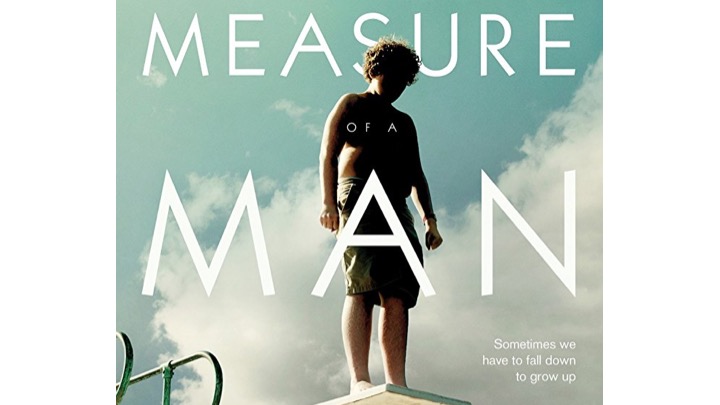“Measure of a Man” – “I hated summer vacation. For me, it wasn’t about anticipation. It was about preparation.” – Bobby Marks (Blake Cooper)
“For me, growing up and going to school and not seeing any anti-bullying posters and not hearing people talk about bullying was very desolate.” – poet Shane Koyczan
A lush, serene lakeside community – complete with canoes, a diving board attached to a dock, hiking trails sprawling in every direction, and families enjoying warm days, cool nights and plenty of laughs – sounds like a welcoming way to spend a summer vacation.
Not for Bobby. He dreads it.
Like many teenagers, Bobby is not comfortable in his own skin, and in his particular case, he is overweight and terribly self-conscious about it. He feels that he should stay on “the edge of everything” rather than run in cool people-circles. His lack of self-esteem also – unfortunately – attracts bullying like a magnet, and in director Jim Loach’s “Measure of a Man”, Bobby finds himself facing this miserable adolescent turbulence during the summer of 1976.
The chosen time period for this coming-of-age picture (also accompanied by a terrific ‘70s soundtrack that sometimes really pops off the screen) plays a huge factor. Life in the mid-1970s did not come with the safety nets that we enjoy in 2018.
Dentists filled cavities with mercury, automobile passengers treated seatbelts as a nice option and smoking was allowed, um, everywhere!
Although bullying has occurred in every era in human history, at least parents, teachers, students, and society at large now recognize it as a significant problem for kids and their emotional growth.
Awareness and speaking out are up!
For Bobby, speaking out really isn’t his thing, and especially this summer, because much of his support system inconveniently is not present. His best friend Joanie (Danielle Rose Russell) and her family suddenly head back home, and his dad (Luke Wilson) spends most of his time working in the city. Not that Marty (Wilson) gives Bobby much support anyway, as he generally lays down the law, gripes about his son’s work ethic and then makes a quick exit.
The point is that Loach and screenwriter David Scearce ensure that Bobby spends much of his time alone, and they leave him to his own devices. When the local jerk Willie Rumson (Beau Knapp) and his two buddies repeatedly snipe, tease and physically harm Bobby – other than one save at a carnival in the film’s first act – no one is really present to help.
Even when his mom Lenore (Judy Greer) kindly probes Bobby to share his troubles, he clams up and provides no useful fodder. Circumstances have left Bobby on his own, but he also chooses to be, as the film truly conveys his isolation. Despite many, potentially helpful faces at his disposal, the chosen time period, Joanie’s split, and the filmmakers’ intentions, the movie leaves the audience with one conclusion: Bobby has to face Willie man-to-man.
Thankfully, he receives inspiration from an unlikely source, Dr. Kahn (Donald Sutherland), who needs a groundskeeper to care for his lawn and other related jobs and hires Bobby to work from 9am to 3pm, Monday through Friday. Sutherland is a joy to watch as this aging taskmaster with oceans of life experience trains this green – but aspiring – green thumb using the cadence of some of his best work, like the mysterious X in “JFK” (1991). The good doctor challenges Bobby by correcting his English, eliciting proper conversational responses and providing a platform for hard work with a steely, calm demeanor, and some of the best scenes in the movie contain the back and forth between master and student.
At this age, Bobby is highly malleable. Since his father’s dismissive, semi-tough love runs only one way and mainly downhill, Bobby can learn a lot through Dr. Kahn, who encourages an equal exchange, even though the end results do not immediately seem fair.
It is fair to say that “Measure of Man” covers familiar coming-of-age ground, but the film excels (via its set design, characters, written and directed human interactions, and performances) as a time warp to yesterdecade, when we spent more time fending for ourselves. Although the movie has some amusing moments, and many times they are engineered by small exchanges between family members and friends, it really functions as a drama, like 2009’s “Adventureland”.
Yes, this is Bobby’s adventure/journey, but Loach and Scearce ensure that all the main characters carry important threads, as they each harbor varying degrees of secrets. Even though Lenore, Marty and Michelle do not receive substantial chucks of screen time, they have appealing depth. After the credits roll, we hope that they communicate their internal concerns to one another more often, but then again, they do not live in 2018, a time when we probably share a bit too much. Yes, life in 1976 was a simpler time, but as “Measure of a Man” shows, it was not necessarily easier.
⭐⭐⭐ out of ⭐⭐⭐⭐
Image credits: Great Point Media; Trailer credits: Movieclips Indie




